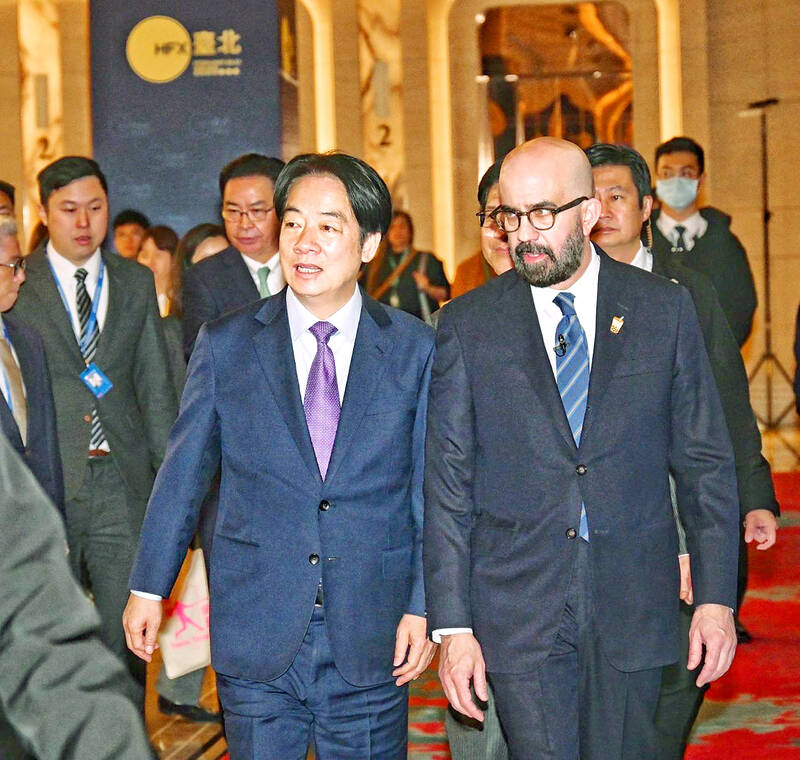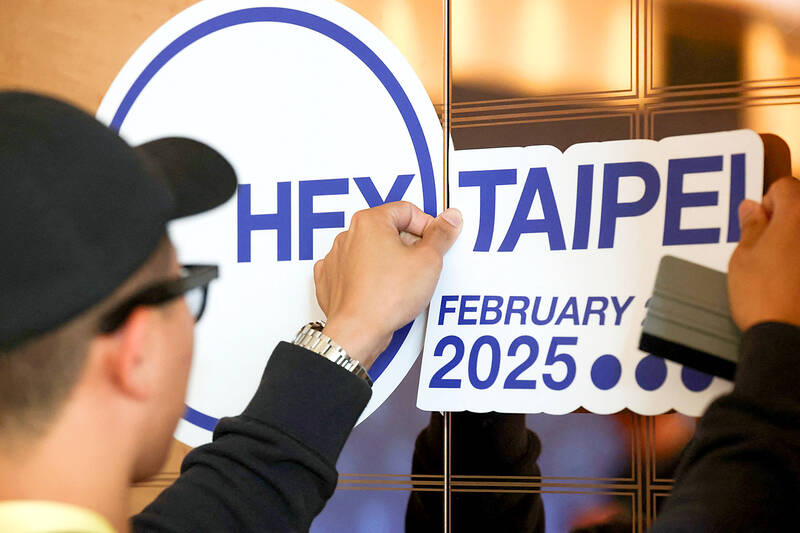Democratic nations must band together to counter consolidating authoritarian powers and build “non-red” supply chains, President William Lai (賴清德) said at the opening of the two-day Halifax International Security Forum (HFX) yesterday.
Taiwan occupies a critical position in the first island chain, safeguarding national sovereignty, maintaining a democratic way of life, and defending peace and security in the Taiwan Strait while facing authoritarian threats directly, Lai said at the event, which is being held in Taipei for the first time.
Taiwan will uphold “peace through strength,” he added.

Photo: Fang Pin-chao, Taipei Times
As a responsible member of the international community, Taiwan will not provoke conflicts and will maintain the “status quo” in the Taiwan Strait, while being willing to engage in dialogue with China under the principles of equality and dignity, he said.
The government has proposed increasing defense spending to more than 3 percent of GDP and established the Whole-of-Society Defense Resilience Committee last year, which is to pursue global peace by deepening relations with democratic allies and improving their defense resilience, he said.
Technological strength, being the backbone of national defense, is key to deterring the expansion of authoritarianism, while it is also crucial to improve economic resilience by boosting industrial development, he said.

Photo: Ann Wang, Reuters
As a country with a leading position in the semiconductor industry, Taiwan is willing to work with democratic allies to build a “non-red supply chain” to pursue mutual economic benefits and maintain global peace, he said.
HFX president Peter van Praagh said that the forum being held in Taipei demonstrated the support of the international community for Taiwan.
“Taiwan is a vital democracy whose continued freedom and security is important not only to the people of Taiwan, but to the security of the entire world,” Van Praagh told a news conference before the event.
It is the first time that the forum is being held outside North America since it was launched in 2009 and it is not a coincidence that it is held in Taiwan, which is a vibrant democratic country facing potential aggression from its neighbor using “gray zone” tactics, Van Praagh said.
The aim of the forum is to explore how international society should cope with the situation and most importantly what Taiwan can do, he said.
“Through HFX Taipei, I wanted to bring democracies to Taipei to see and understand why Taiwan deserves the international community’s friendship and support,” Van Praagh added.
He thanked United Microelectronics Corp (聯電) founder Robert Tsao (曹興誠), who also gave a speech, for his support.
Asked how US President Donald Trump’s stance toward the Ukraine war could affect Taiwan, Tsao said that Taiwan could unite and demonstrate its determination to safeguard democracy, despite not being able to predict what Trump would do.
The US will not help a country where 60 percent of its people support unification, so Taiwan should “help itself before expecting help from others,” Tsao said.
The international society views Taiwan as a whole, despite its internal differences, he said, adding that no political struggle should sacrifice Taiwan’s sovereignty and international status.
In his speech, Tsao thanked the forum for excluding China’s participation and not bowing to its pressure by including Taiwan.
The event features on-and-off-the-record speeches by former government officials and academics from more than 70 countries, including former president Tsai Ing-wen (蔡英文) and Akie Abe, former Japanese prime minister Shinzo Abe’s widow, on issues concerning democracy, security, resilience and partnership, the organizers said.
HFX is a Washington-based organization that has run the Halifax International Security Forum in Nova Scotia, Canada, every year since 2009.

Right-wing political scientist Laura Fernandez on Sunday won Costa Rica’s presidential election by a landslide, after promising to crack down on rising violence linked to the cocaine trade. Fernandez’s nearest rival, economist Alvaro Ramos, conceded defeat as results showed the ruling party far exceeding the threshold of 40 percent needed to avoid a runoff. With 94 percent of polling stations counted, the political heir of outgoing Costa Rican President Rodrigo Chaves had captured 48.3 percent of the vote compared with Ramos’ 33.4 percent, the Supreme Electoral Tribunal said. As soon as the first results were announced, members of Fernandez’s Sovereign People’s Party

MORE RESPONSIBILITY: Draftees would be expected to fight alongside professional soldiers, likely requiring the transformation of some training brigades into combat units The armed forces are to start incorporating new conscripts into combined arms brigades this year to enhance combat readiness, the Executive Yuan’s latest policy report said. The new policy would affect Taiwanese men entering the military for their compulsory service, which was extended to one year under reforms by then-president Tsai Ing-wen (蔡英文) in 2022. The conscripts would be trained to operate machine guns, uncrewed aerial vehicles, anti-tank guided missile launchers and Stinger air defense systems, the report said, adding that the basic training would be lengthened to eight weeks. After basic training, conscripts would be sorted into infantry battalions that would take

GROWING AMBITIONS: The scale and tempo of the operations show that the Strait has become the core theater for China to expand its security interests, the report said Chinese military aircraft incursions around Taiwan have surged nearly 15-fold over the past five years, according to a report released yesterday by the Democratic Progressive Party’s (DPP) Department of China Affairs. Sorties in the Taiwan Strait were previously irregular, totaling 380 in 2020, but have since evolved into routine operations, the report showed. “This demonstrates that the Taiwan Strait has become both the starting point and testing ground for Beijing’s expansionist ambitions,” it said. Driven by military expansionism, China is systematically pursuing actions aimed at altering the regional “status quo,” the department said, adding that Taiwan represents the most critical link in China’s

‘REALLY PROUD’: Nvidia would not be possible without Taiwan, Huang said, adding that TSMC would be increasing its capacity by 100 percent Nvidia Corp CEO Jensen Huang (黃仁勳) on Saturday praised and lightly cajoled his major Taiwanese suppliers to produce more to help power strong demand for artificial intelligence (AI), capping a visit to the country of his birth, where he has been mobbed by adoring fans at every step. Speaking at an impromptu press conference in the rain outside a Taipei restaurant, where he had hosted suppliers for a “trillion-dollar dinner,” named after the market capitalization of those firms attending, Huang said this would be another good year for business. “TSMC needs to work very hard this year because I need a lot